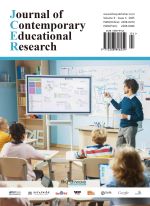Abstract
Qigong is an important part of traditional Chinese health preservation culture, and the accurate translation of its terms is of great significance for international communication. Currently, there are many deficiencies in the translation of Qigong terms, such as a lack of systematicity and inconsistent translations. Based on hermeneutics theory, this study analyzes the factors influencing the acceptance of Qigong term translations, and constructs an evaluation model for translation acceptance, covering three dimensions: culture, language, and readers. Accordingly, translation strategies are proposed, including culturally adaptive translation, optimization of language structure, reader stratification strategies, horizon fusion, and the hermeneutic circle, etc. The aim is to balance the cultural connotations and readers’ acceptance, and to promote the international communication of Qigong culture.
References
Fan X, 2019, Research on the Status Quo and Strategies of English Translation of Fitness Qigong Terms, dissertation, Liaoning Normal University.
Wang T, 2022, A Study on the French-English Translation of Baduanjin Practice from the Perspective of Adaptive Selection Theory, dissertation, Beijing University of Chinese Medicine.
Zhang Q, 2019, Practice Report on English Translation under the Guidance of Relevance Theory—Qigong and Tai Chi Part of the World Health Organization Glossary of Chinese Medicine, dissertation, Shanghai University of Traditional Chinese Medicine.
Zhao X, Qian H, Wen J, et al., 2017, Study on English Translation of Action Names of Wuqin Opera. Journal of Guangxi University of Traditional Chinese Medicine, 20(3): 101–103.
Zuo Z, 2020, An Analysis on the Cultural Connotation and English Translation of the Name of “Five Poultry Plays” Exercises. Chinese Science and Technology Terminology, 22(5): 68–71.
Wang B, 2019, On the Cultural Facsimile Translation of TCM Terms in the Fitness Qigong Book “Going Ou”: A Consideration Centered on the English Translation of Wuqin Xi. Journal of Yichun University, 42(1): 68–73.
Wang S, Zeng J, Zhang C, 2019, An Analysis on the English Translation of TCM Terms for Fitness Qigong. Chinese Journal of Basic Medicine of Traditional Chinese Medicine, 25(10): 1426–1429.
Zhang Q, Sang Z, 2019, Application of Xuanzang’s “Five Untranslated” Theory in English Translation of TCM Qigong Terms: A Case Study of the Translation of TCM Qigong Terms by the World Health Organization (WHO). Chinese Medicine Culture, 14(03): 73–78.
Gadamer HG, 1960, Truth and Method, Bloomsbury Academic, London.
Steiner G, 1975, After Babel: Aspects of Language and Translation, University Press, Oxford.
Huang Y, 2022, A Study on the English Translation of Compendium of Materia Medica from the Perspective of Philosophical Hermeneutics. Global Journal of Traditional Chinese Medicine, 15(03): 506–510.
Qu Q, 2021, A Philosophical Hermeneutic Perspective on the English Translation of Huangdi Neijing. Medicine and Philosophy, 42(01): 77–80.
Wen X, 2023, A Comparative Study on the Translation of The Mystery of Pulse and Yang’s Pulse Classic from the Perspective of Hermeneutics, dissertation, University of Chinese Medicine.
Zhang C, Sun X, 2023, A Study on the Translation Strategies of Chinese Classics from the Perspective of Hermeneutics: A Case Study of Luo Xiwen’s Compendium of Materia Medica. Modern English, (17): 111–113.
Li B, Ran Y, 2022, A Study on Translator Subjectivity in Manual Translation from the Perspective of Hermeneutics: A Case Study of the English Translation of Traditional Chinese Health in Taijiquan. English Abroad, (07): 27–29.
Zhu B, 2024, A Comparative Study of Translators’ Subjectivity in Compendium of Materia Medica from the Perspective of Hermeneutics, dissertation, Henan University of Technology.
Xu T, 2019, Research on “Noise Reduction” in the Translation of Traditional Chinese Medicine Cultural Publicity from the Perspective of Communication, dissertation, Shanghai International Studies University.
Shanghai Qigong Research Institute, 2015, Dictionary of Commonly Used Terms of TCM Qigong: English and Chinese, Shanghai Science and Technology Press, Shanghai.
Li Z, Liu X, 2020, Chinese-English Dictionary of Qigong, Shanghai Science and Technology Press, Shanghai.
